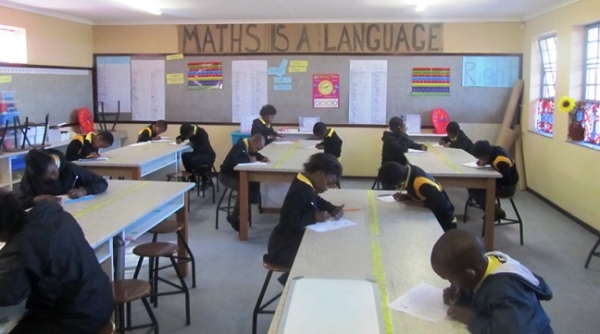

Students at Ukanyo Primary School in Masiphumelele learn maths in a specially designed Maths Lab. Picture by Bernard Chiguvare.
25 August 2015
Students at Ukanyo Primary School in Masiphumelele informal settlement are taking part in a Maths Lab initiative designed to boost their maths skills.
The initiative, launched by Americans Scott and Laurie Smith in March this year, offers students the opportunity to learn mathematical concepts through activities with materials.
The concept is similar to science labs.
“Instead of children listening to the teacher talking for an hour, which is the normal practice, in their respective classes they do practical maths on the tables,” says Scott Smith. “The teacher does very little talking and goes around assisting groups.”
Students at Ukanyo use geo-boards, fraction boards and paper plates for experiments. The emphasis is on practical education.
“Instead of the teacher explaining what a third or quarter is, children see and compare the fractions using the materials given,” says Smith. Human beings learned better if they discovered for themselves.
The couple, who do not speak isiXhosa, decided to launch the project among grade 4 students because they can learn in English. The students and their teachers come to the lab for maths classes.
When Groundup visited the school on Monday 17 August, the Smiths were busy with one group of students. The Grade 4 maths head teacher was working with another group in another corner.
During break, when students usually play outside, some showed interest in continuing with their maths assignments.
Grade 4 student Emihle Mpengesi said she loved maths and would like to continue with it to matric.
“I like maths very much because maybe in life I will come across what I am practising now in the lab,” she said.
“Maths is now easy for me since we started learning from the lab,” said another grade 4 learner, Milowa Ngxangxa.
“We have realised since inception of this project that some pupils are willing to learn and prepared to learn faster, so we are trying to help teachers understand how to go faster,” says Smith.
Almost a third of the grade 4 students, some of them from rural areas, did not seem to have a good maths background from previous grades, according to Smith. He was also concerned about high student-teacher ratios.
There are 240 grade 4 students at the school, and each class has 40 students.
Smith said though the Western Cape Education Department approved this ratio of students to teachers, he thought it made learning difficult.
Sibongile Boqwana, maths head, said though the project was still at its early stages she expected it would raise students’ performance in maths.
Zama Maqwathini, grade 4 head teacher, said children were enthusiastic about the Maths Lab project. “What I also like about this lab is that all learners are attended to, since there will be at least three teachers in the class.”
The Smiths, who were primary school teachers in the USA, intend to run the project for three years and are training teachers to take over.
“This is an outstanding initiative,” said Jessica Shelver, of the Western Cape Education Department.